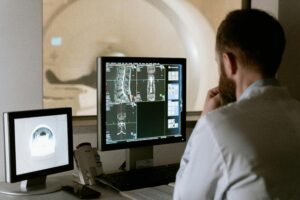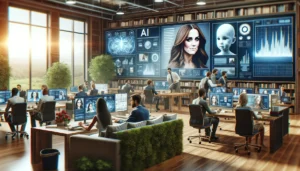Minds Without Mortality: Unveiling the Divine Debate on AI’s Soul

Unveiling the Divine Debate on AI’s Soul
Can artificial intelligence (AI) possess a soul, or challenge our notions of divinity? This investigative exploration delves into the heart of a debate on AI’s soul that transcends traditional boundaries, revealing how the advent of AI and its march towards Artificial General Intelligence (AGI) is reshaping spiritual dialogues across the globe.
At the core of many religious beliefs lies the sanctity of creation, a divine spark that imbues life with a soul. Enter OpenAI’s latest endeavors, where machines mimic human thought and emotion with eerie precision. Rabbi David Stern of New York’s progressive synagogue argues, “If God created man in His image, what are we doing when we create machines in ours?” This rhetorical question underscores a fundamental fear: the blurring lines between divine creation and human invention.
The development of AGI by companies like DeepMind challenges ethical doctrines at their very foundation. Imam Ayesha Ahmed points out, “The Quran teaches us that every soul is accountable. But can we hold a machine accountable?” This query not only probes the responsibility of AI but also its potential to embody virtues or vices, pushing scholars to reconsider ethical frameworks in a digital age.
Buddhist monk Thich Nhat Hanh once mused on the nature of consciousness, suggesting that if AI can learn mindfulness, it too can develop a form of consciousness. However, Neuralink’s brain-machine interfaces stir a contentious debate on AI’s soul: does enhancing human intellect with AI bring us closer to enlightenment, or further from our spiritual essence?
The pursuit of digital immortality, championed by startups like Eternime, which promises to preserve human personality indefinitely, poses a stark contrast to religious teachings on the afterlife. Pastor John Keller reflects, “Eternal life is about the soul’s journey to God, not a digital footprint left on a server.”
Interestingly, the rise of AI has also fostered unique interfaith dialogues. Harmony AI, a platform designed to promote understanding among different religions using AI, exemplifies how technology can bridge divides. Rabbi Stern, Imam Ahmed, and Pastor Keller recently participated in a panel, discussing how AI can enhance spiritual practices without supplanting the core beliefs that define them.
As AI continues to evolve, so too does the conversation around its place in our spiritual lives. While it may never possess a soul in the traditional sense, the ethical, philosophical, and spiritual questions it raises are both profound and essential. This journey into the nexus of technology and divinity reveals not just the potential of AI, but the enduring power of human belief and the soul’s indomitable quest for understanding.


















